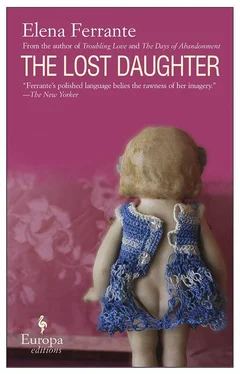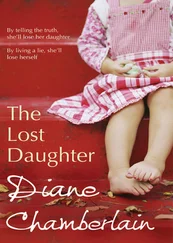I, too, was hiding many dark things, in silence. The remorse of ingratitude, for example: Brenda. It was she who had given Hardy my text, he told me himself. I don’t know how they knew each other, and didn’t want to know what reciprocal debts they had. Today I know only that my pages would never have gotten any attention without Brenda. But at the time I told no one, not even Gianni, not even my professor, and above all I never looked for her. It’s something that I admitted only in the letter to the girls two years ago, the one they never read. I wrote: I needed to believe that I had done everything alone. I wanted, with increasing intensity, to feel myself, my talents, the autonomy of my abilities.
Meanwhile things were happening in a chain reaction, seemingly the confirmation of what I had always hoped for. I was good; I didn’t need to pretend a kind of superiority, as my mother did; I really was a creature out of the ordinary. My professor in Florence was finally sure of it. The famous, sophisticated Professor Hardy was sure of it, he seemed to believe it more than anyone. I left for England, I returned, I left again. My husband was alarmed, what was happening. He protested that he couldn’t keep up with work and the children both. I told him that I was leaving him. He didn’t understand, he thought I was depressed, he looked for solutions, called my mother, cried that I had to think of the children. I told him that I couldn’t live with him any longer, I needed to understand who I was, what were my real possibilities—and other lines like that. I couldn’t announce that I already knew all about myself, I had a thousand new ideas, I was studying, I was loving other men, I was in love with anyone who said I was smart, intelligent, helped me to test myself. He calmed down. For a while he tried to be understanding, then he sensed that I was lying, got angry, moved on to insults. Finally he said do what you want, get out.
He had never really believed that I could go without the children. Instead I left them to him, and was gone for two months; I never called. It was he who hunted me down, from a distance, harassing me. When I returned, I did so only to pack my books and notes, for good.
On that occasion I bought dresses for Bianca and Marta, and brought them as a gift. Small and tender, they wanted help in putting them on. My husband took me aside gently, asked me to try again, began to cry, said he loved me. I said no. We quarreled, and I shut myself in the kitchen. After a while I heard a light knocking. Bianca came in, very serious, followed by her sister, timidly. Bianca took on orange from the tray of fruit, opened a drawer, handed me a knife. I didn’t understand, I was running after my own desires, I couldn’t wait to escape that house, forget it and forget everything. Make a snake for us, she asked then, for herself and Marta, too, and Marta smiled at me encouragingly. They sat in front of me waiting, they assumed the poses of cool and elegant little ladies, in their new dresses. All right, I said, took the orange, began to cut the peel. The children stared at me. I felt their gazes longing to tame me, but more brilliant was the brightness of the life outside them, new colors, new bodies, new intelligence, a language to possess finally as if it were my true language, and nothing, nothing that seemed to me reconcilable with that domestic space from which they stared at me in expectation. Ah, to make them invisible, to no longer hear the demands of their flesh as commands more pressing, more powerful than those which came from mine. I finished peeling the orange and I left. From that moment, for three years, I didn’t see or hear them at all.
The buzzer sounded, a violent electric charge that reached the terrace.
I looked at the clock mechanically. It was two in the afternoon, I couldn’t imagine anyone in the town who knew me well enough to ring at that hour. Gino, it occurred to me. He knew where I lived, maybe he had come for advice.
The buzzer sounded again, less decisive, shorter. I left the terrace, went to answer.
“Who is it?”
“Giovanni.”
I sighed, better him than the words with no outlet in my head, and pressed the button to open the street door. I was barefoot and looked for my sandals, I buttoned my shirt, adjusted my skirt, smoothed my wet hair. At the sound of the bell, I went to the apartment door. He stood before me, sunburned, his white hair carefully combed, a slightly loud shirt, blue pants with an impeccable crease, polished shoes, and a paper-wrapped package in his hand.
“I’ll take just a minute of your time.”
“Come in.”
“I saw the car, I said: the signora has come back already.”
“Come in, sit down.”
“I don’t want to bother you, but if you like fish, this is just caught.”
He came in, offered me the package. I closed the door, took his gift, made an effort to smile, and said:
“You are very kind.”
“Have you had lunch?”
“No.”
“You can even eat this raw.”
“I would find that disgusting.”
“Then fried, and eaten very hot.”
“I don’t know how to clean it.”
He went from being timid to abruptly invasive. He knew the house, he went to the kitchen, began to gut the fish.
“It will take no time,” he said. “Two minutes.”
I looked at him ironically as with expert motions he removed the guts of that lifeless creature and then scraped away scales as if to take from them their sheen, their color. I thought that probably his friends were waiting at the bar to find out if his undertaking had been successful. I thought that now I had made the mistake of letting him come in and that, if my hypothesis was solid, he would stay, one way or another, long enough to make plausible what he would then recount. Males always have something pathetic about them, at every age. A fragile arrogance, a frightened audacity. I no longer know, today, if they ever aroused in me love or only an affectionate sympathy for their weaknesses. Giovanni, I thought, whatever happened, would boast of his prodigious erection with the stranger, without drugs and despite his age.
“Where do you keep the oil?”
He attended to the frying skillfully, his words tumbling out nervously, as if his thoughts were moving too fast for the structure of the sentences. He praised the past, when there were more fish in the sea and the fish were really good. He spoke of his wife, who had died three years earlier, and his children.
“My oldest son is much older than you.”
“I don’t think so—I’m old.”
“What do you mean old, you’re forty at most.”
“No.”
“Forty-two, forty-three.”
“I’m forty-eight, Giovanni, and I have two grownup daughters, one is twenty-four and one twenty-two.”
“My son is fifty, I had him at nineteen, and my wife was only seventeen.”
“You’re sixty-nine?”
“Yes, and three times a grandfather.”
“You don’t look it.”
“All show.”
I opened the only bottle of wine I had, a red from the supermarket, and we ate the fish on the table in the living room, sitting beside one another on the couch. It was astonishingly good. I began to talk a lot, feeling reassured by the sound of my voice. I talked about work, about my daughters—mainly about them. I said: they didn’t give me many headaches. They were good students, always promoted, they graduated with high marks, they’ll become excellent scientists, like their father. They live in Canada now, one is there—more or less—to complete her studies and the older one for work. I’m pleased, I’ve done my duty as a mother, I’ve kept them safe from all the dangers of today.
I talked and he listened. Every so often he said something about himself. His older son was a surveyor, his wife worked at the post office; the second, a daughter, had married a good fellow, the one who had the newsstand in the square; the third was his cross, he wouldn’t study, made a little money only in the summer, taking tourists out in his boat; the youngest, a daughter, was a bit behind in her studies, she had had a serious illness, but now she was about to graduate from university, she would be the first in the family.
Читать дальше












